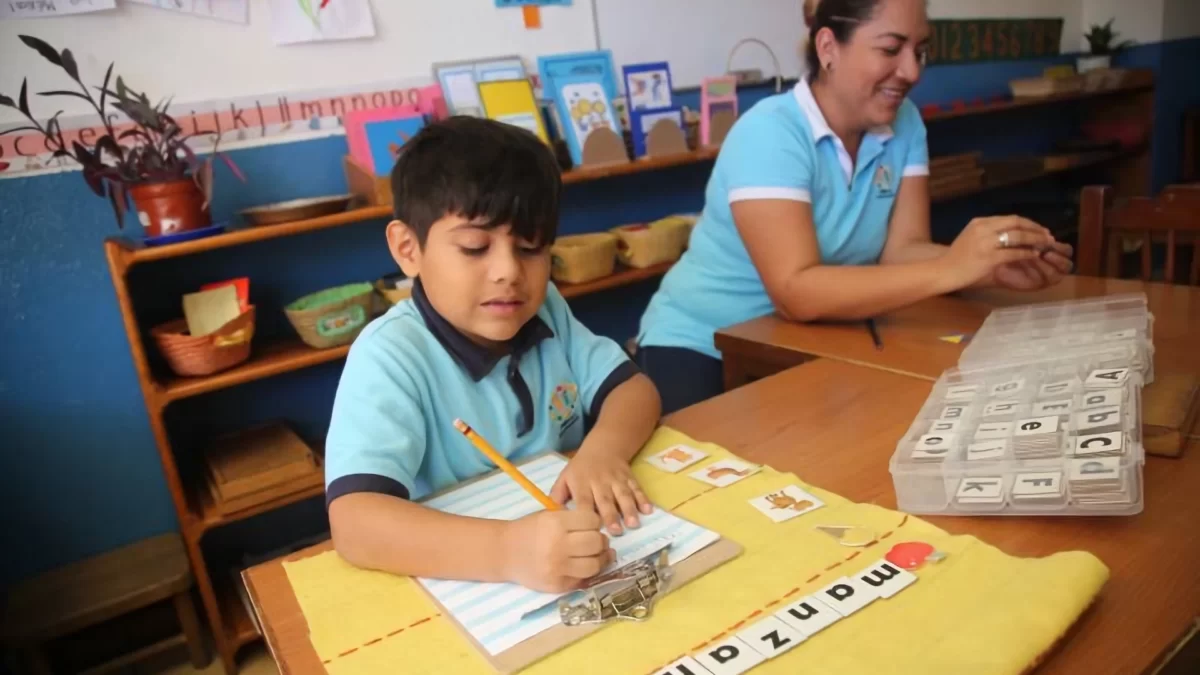The way in which language is taught in education is an important issue and currently there are various models and methodologies. However, the traditional school is still the norm in many places. In this text, we explore the difference in the study of language between the traditional school and the Montessori model, and highlight the benefits of Montessori education.
Study of language in the traditional school
The traditional language teaching method generally focuses on teaching grammar, syntax, and spelling. Students focus on memorizing grammar rules and correcting mistakes in written exercises.
Students learn through repetition and memorization, rather than exploring and discovering the language on their own. The emphasis is on precision and correctness rather than creativity and personal expression. Students often work individually on exercises and homework assigned by the teacher.
In contrast, Montessori education is based on the idea that children learn best through hands-on experience and independent exploration.
Language in the Montessori method
In Montessori education, the study of language is integrated into all areas of learning and focuses on effective communication and understanding. Students have the opportunity to work with concrete and manipulative materials to learn letter sounds and word construction. They also have the freedom to talk and communicate with each other, which allows them to develop active listening and conversation skills.
A study of Angeline Lillard and Nicole Else-Quest published in the journal Science in 2006 compared the results of vocabulary and writing tests of children who had received a Montessori education and children who had attended a traditional school. The results showed that children from Montessori education scored significantly higher on both tests than children from traditional school. According to the study authors:
“Montessori education children had acquired advanced reading and writing skills in a more relaxed and natural way, and had also developed important skills such as creativity, initiative and self-confidence.”
(Lillard & Else-Quest, 2006).
Additionally, Montessori education encourages reading and writing from an early age, leading to increased fluency and comprehension. Montessori education students have the opportunity to read and write at their own pace and according to their interests, which allows them to develop critical thinking skills and creativity.
In a study published in 2013 by the journal Journal of Educational and Social Research, author Catherine Chabot examined the impact of Montessori education on the reading and writing skills of children ages 3-6. The results showed that Montessori education students had greater growth in letter writing and word identification than traditional school students. In addition, Montessori education students also demonstrated increased ability to read and write sentences and complete sentences.
Another benefit of Montessori education in the study of language is the attention to cultural and linguistic diversity. Students have the opportunity to learn about different cultures and languages through reading and writing texts in different languages, as well as communicating with other students from different cultural backgrounds.

Benefits of the Montessori method in language learning
- Improve oral and written expression: According to a study published in the scientific journal "Frontiers in Psychology" in 2017, children who were educated with the Montessori method showed a greater ability to communicate effectively both orally and in writing.
- Encourages individualized learning: The Montessori method is based on individualized learning, where each child learns at their own pace. This allows children to focus on their own interests and strengths, which can improve their motivation to learn language.
- Promotes self-correction: In Montessori classrooms, children are encouraged to identify and correct their own language errors, which helps develop self-confidence and the ability to self-assess.
- Promotes multisensory learning: The Montessori philosophy involves the use of sensory materials to help children understand abstract linguistic concepts. For example, the use of sand letters to learn to read and write.
- Develop critical thinking skills: The Montessori methodology encourages critical thinking and problem solving, which can help children analyze and understand language more deeply.
Therefore, Montessori education should be considered as a valuable option for those seeking an effective and equitable education in the study of language.
Sources:
- Lillard, AS (2017). Montessori education and neuroscience: A review of the research. Frontiers in Psychology, 8, 1-13. https://doi.org/10.3389/fpsyg.2017.01896
- Lillard, AS (2005). Montessori: The science behind the genius. Oxford University Press. https://global.oup.com/academic/product/montessori-9780195168687?cc=us&lang=en&
- Montessori, M. (1912). The Montessori method: Scientific pedagogy as applied to child education in the children's houses. Frederick A. Stokes. https://www.gutenberg.org/ebooks/24244
- Feez, S., & Cunio, K. (2013). Montessori and early childhood: A guide for students. Cambridge University Press. https://www.cambridge.org/core/books/montessori-and-early-childhood/7F7F2EC00733C3135DD2EE8E1C60CF22
- Hynes, E. (2013). The Montessori method and the child's language. Journal of the Irish Association of Applied Linguistics, 13(1), 67-81. https://journal.iraal.ie/index.php/teanga/article/view/35/10
- Chabot, C. (2013). The effects of Montessori education on the reading and writing skills of 3- to 6-year-old children. Journal of Educational and Social Research, 3(9), 61-68. https://www.mcser.org/journal/index.php/jesr/article/view/238
- Lillard, AS, & Else-Quest, N. (2006). Evaluating Montessori education. Science, 313(5795), 1893-1894. https://doi.org/10.1126/science.1132362
- Wu, C.-Y. (2015). Culturally responsive teaching in Montessori language education. International Journal of Humanities and Social Science Research, 4(2), 38-42.
http://www.ijhssrnet.com/journals/Vol_4_No_2_February_2015/5.pdf
Regarding the importance of language stimulation in Millaray Montessori, we offer quality information at the school for parents as in the last talk about: "Language: Strategies for detection and stimulation" taught by Lic. Angélica Moran. If you have questions or want more information about it, contact:
